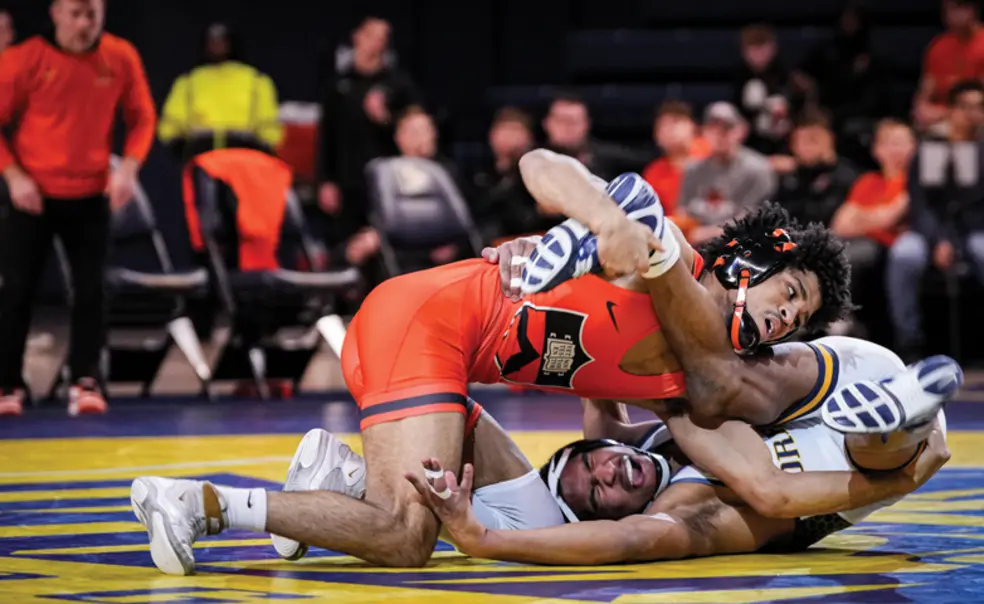High-Stakes Tournament Gives Ivy League Wrestlers a New Path to Nationals
Princeton is slated to host inaugural Ivy League Tournament at Jadwin Gym on March 9
The Ivy League wrestling season has historically been an intense round-robin that spans about a month, from late January to late February. Beginning this year, the six Ivy teams will meet again in March for a one-day, high-stakes tournament as the league’s top wrestlers vie for automatic bids to the NCAA Championships.
“There’s a little bit more pride that goes into it when it comes to competing against other Ivy League teams,” said Ty Whalen ’27, a Princeton co-captain. “In the dual meet setting, it’s already very competitive. But to have all six teams in one room, I think that will definitely be fun.”
Princeton will host the inaugural Ivy League Tournament at Jadwin Gym on March 9 with a Tigers lineup that includes Luke Stout ’25 (197 pounds), a three-time NCAA qualifier; Whalen (149 pounds), who returned from injury in January and won seven of his next eight matches; and newcomer Marc-Anthony McGowan ’28 (125 pounds), who posted a 13-2 record through early February.
“From a holistic standpoint, this is going to catapult Ivy League wrestling into one of the better conferences [in the country].”
Joe Dubuque
Wrestling head coach
Launching the tournament meant leaving the Eastern Intercollegiate Wrestling Association (EIWA), Princeton’s home conference for more than a century, and head coach Joe Dubuque said the decision was not made lightly. Stats from recent years showed that Ivy wrestlers were responsible for nearly half of the NCAA automatic bids allocated to the EIWA Tournament, despite making up just over one third of the 17-team field. If that trend continues, the Ivy League Tournament could average more than two bids per weight class. (Update: The NCAA announced allocations on Feb. 27, and the Ivy League received 26 automatic bids; see here for details.)
“From a data standpoint … this looks to be better for not only Princeton wrestling but for the Ivy League,” Dubuque said. “I think as a whole, Ivy League wrestling is getting better and better every year. … From a holistic standpoint, this is going to catapult Ivy League wrestling into one of the better conferences [in the country].”
Clay McEldowney ’69, a wrestling alumnus and devout supporter of the program, agrees that the Ivy League “is much stronger in wresting than it’s ever been — the quality of the competition, the preparation of the athletes.” But he questions whether breaking away from the EIWA was the right move.
The two-day EIWA Tournament has been a huge draw for wrestling fans and an electric atmosphere for the athletes, McEldowney said. He wonders if the Ivy Tournament can consistently provide the same kind of experience — and, if it doesn’t, whether that would have a negative long-term effect on things like recruiting and the number of NCAA qualifiers.
“Anecdotally, most alumni are not in favor,” said McEldowney, who still plans to be at Jadwin in March, decked out in orange and black.
Dubuque understands those concerns and has been working with Princeton’s events team to make the tournament a showcase of the sport that draws a healthy crowd to Jadwin. He’s reached out to alumni, students, and the region’s youth and high school wrestling communities. (New Jersey’s high school state championships wrap up the day before the Ivy meet.)
“The way we put this tournament together, the way we run it, the way we promote it is very, very important for the future of Ivy League wrestling,” Dubuque said.
A strong Ivy season by the Tigers could help build momentum. Princeton dominated its first three Ivy dual meets, defeating Columbia, Brown, and Harvard, before losing on the road at perennial powerhouse Cornell. The Tigers host Stanford, led by former Princeton coach Chris Ayres, on senior night Feb. 13.
As of Feb. 11, five Tigers held spots in InterMat’s national rankings. The program has averaged five NCAA qualifiers per year in its last nine seasons, including 2020, when the meet was canceled due to COVID.












No responses yet